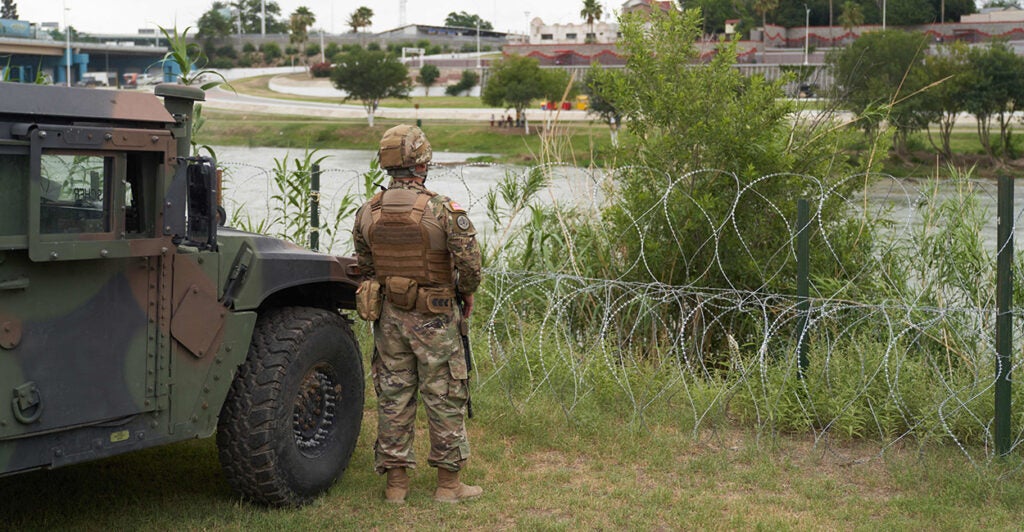Republican governors are sending National Guard troops to the southern border.
Governors of Arkansas, Iowa, North Dakota, Ohio, Oklahoma, South Carolina, South Dakota, Virginia, and West Virginia announced this week they will send troops and resources to Texas to support the work of Texas Gov. Greg Abbott and Operation Lone Star to secure the southern border.
“President [Joe] Biden’s failure at our southern border puts the entire country at risk,” Arkansas Gov. Sarah Huckabee Sanders said Thursday. “States must now step up where the president has failed to repel illegals, fight the cartels, and stop human and drug trafficking.”
Sanders is sending 80 National Guard troops to the border in July. Oklahoma Gov. Kevin Stitt will send troop but has not clarified how many, and North Dakota Gov. Doug Burgum also announced Thursday that he will send 100 National Guardsmen to Texas to help secure the southern border. Gov. Mike DeWine says he will send 14 State Highway troopers and supervisors to Texas for two weeks. South Dakota Gov. Kristi Noem says she will deploy about 50 National Guard troops to the border this summer.
Arkansas, North Dakota, Ohio, Oklahoma, and South Dakota join nine other GOP governors who have already pledged to send troops and resources to Texas to help secure the state’s border with Mexico.
“The ongoing border crisis facing our nation has turned every state into a border state,” Virginia Gov. Glenn Youngkin said in a statement Wednesday.
“Given the intensive resource demands on Texas, the dangers posed by the fentanyl crisis, and impact of the border crisis on criminal activity to the Commonwealth, Virginia will do its part to assist the State of Texas’ efforts with the coordinated deployment of Virginia National Guard soldiers to assist in key aspects of their mission,” Youngkin said.
Youngkin is sending 100 troops and 21 supporting personnel to Texas from the commonwealth.
West Virginia Gov. Jim Justice is sending up to 50 National Guard troops and airmen to the border for up to 30 days. South Carolina Gov. Henry McMaster says he will also send troops to the border but has yet to announce how may.
“The safety and security of South Carolinians require that we stop the drug cartels, criminals, and terrorists from entering our country to peddle their poison,” McMaster said in a statement Wednesday.
Iowa Gov. Kim Reynolds said Tuesday that she will send 100 National Guard troops and 30 Department of Public Safety personnel to the border.
The Republican governors’ decision to send troops to the southern border comes in response to Abbott’s request for states to join Texas and help secure the border through the work of Operation Lone Star, Texas’ border security plan.
Nine GOP governors met with Abbott in Austin, Texas, on May 22 to discuss the border crisis. The meeting was held about a week after Abbott sent a letter to fellow governors asking them to help Texas secure the border.
The Texas governor applauded Idaho and Florida for already having sent border security resources and personnel to the Lone Star State to help secure the border and invited more governors to join in the “mission to defend our national sovereignty and territorial integrity and send all available law enforcement personnel and resources to the Texas-Mexico border to serve alongside our thousands of Texas National Guard soldiers and Texas Department of Public Safety (DPS) troopers.”
Last week, Tennessee Gov. Bill Lee announced he will send 100 National Guard troops to the border and Nebraska Gov. Jim Pillen committed to send 10 state troopers to Texas to “help stop the influx of illegal immigration at our southern border.”
Florida, Idaho, and Mississippi were among the first states to answer Abbott’s call for help.
On May 17, Mississippi Gov. Tate Reeves announced he was mobilizing a National Guard unit to the border.
“To keep Mississippians safe and limit the impact of our nation’s open borders, the Mississippi National Guard’s 112th Military Police Battalion has been mobilized and is supporting Customs and Border Protection officers and agents along the Southwest border.”
The day before Reeves’ announcement, Florida Gov. Ron DeSantis said Florida had “over 1,100 assets and resources available” to aid Operation Lone Star, including 800 National Guard soldiers and 200 Florida Department of Law Enforcement officers.
“At my direction, state agencies, including law enforcement and the Florida National Guard, are being deployed to Texas, with assets including personnel, boats, and planes,” DeSantis said. “While Biden ignores the crisis he created, Florida stands ready to help Texas respond to this crisis.”
Since the start of the Biden administration, Customs and Border Protection reports encountering more than 5.5 million illegal aliens at the southern border. Since fiscal year 2023 began on Oct. 1, CBP has encountered more than 1.4 million illegal aliens, about triple the number encountered at the southern border during fiscal year 2020.
CBP has seized a record 17,000 pounds of fentanyl at the southern border so far in fiscal year 2023, which ends Sept. 30, more than triple the total amount seized in all of fiscal year 2020.
Editor’s Note: This report was updated after publican to include the announcement that Oklahoma Gov. Kevin Stitt and South Dakota Gov. Kristi Noem will send National Guard troops to the southern border, and Ohio Gov. Mike DeWine will send 14 State Highway troopers and supervisors to the border.
Have an opinion about this article? To sound off, please email letters@DailySignal.com and we’ll consider publishing your edited remarks in our regular “We Hear You” feature. Remember to include the url or headline of the article plus your name and town and/or state.
